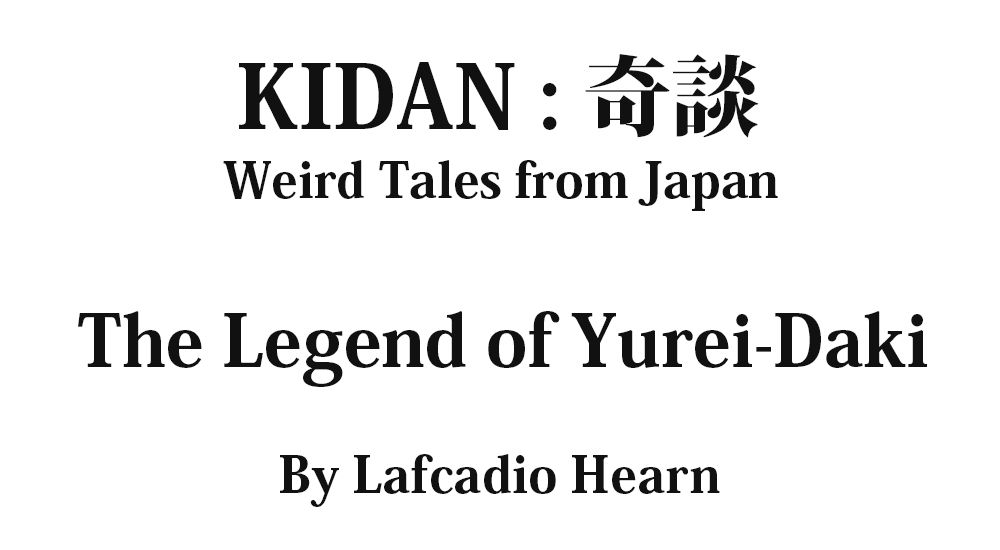The Legend of Yurei-Daki
Near the village of Kurosaka, in the province of Hōki, there is a waterfall called Yurei-Daki, or The Cascade of Ghosts. Why it is so called I do not know. Near the foot of the fall there is a small shintō shrine of the god of the locality, whom the people name Taki-Daimyōjin; and in front of the shrine is a little wooden money-box—saisen-bako—to receive the offerings of believers. And there is a story about that money-box.
One icy winter’s evening, thirty-five years ago, the women and girls employed at a certain asa-toriba, or hemp-factory, in Kurosaka, gathered around the big brazier in the spinning-room after their day’s work had been done. Then they amused themselves by telling ghost-stories. By the time that a dozen stories had been told, most of the gathering felt uncomfortable; and a girl cried out, just to heighten the pleasure of fear, “Only think of going this night, all by one’s self, to the Yurei-Daki!” The suggestion provoked a general scream, followed by nervous bursts of laughter…. “i’ll give all the hemp I spun to-day,” mockingly said one of the party, “to the person who goes!” “So will I,” exclaimed another. “And I,” said a third. “All of us,” affirmed a fourth…. Then from among the spinners stood up one Yasumoto O-Katsu, the wife of a carpenter;—she had her only son, a boy of two years old, snugly wrapped up and asleep upon her back. “Listen,” said O-Katsu; “if you will all really agree to make over to me all the hemp spun to-day, I will go to the Yurei-Daki.” Her proposal was received with cries of astonishment and of defiance. But after having been several times repeated, it was seriously taken. Each of the spinners in turn agreed to give up her share of the day’s work to O-Katsu, providing that O-Katsu should go to the Yurei-Daki. “But how are we to know if she really goes there?” a sharp voice asked. “Why, let her bring back the money-box of the god,” answered an old woman whom the spinners called Obaa-San, the Grandmother; “that will be proof enough” “I’ll bring it,” cried O-Katsu. And out she darted into the street, with her sleeping boy upon her back.
The night was frosty, but clear. Down the empty street O-Katsu hurried; and she saw that all the house fronts were tightly closed, because of the piercing cold. Out of the village, and along the high road she ran—pichà-pichà—with the great silence of frozen rice-fields on either hand, and only the stars to light her. Half an hour she followed the open road; then she turned down a narrower way, winding under cliffs. Darker and rougher the path became as she proceeded; but she knew it well, and she soon heard the dull roar of the water. A few minutes more, and the way widened into a glen,—and the dull roar suddenly became a loud clamor,—and before her she saw, looming against a mass of blackness, the long glimmering of the fall. Dimly she perceived the shrine,—the money-box. She rushed forward,—put out her hand….
“Oi! O-Katsu-San!” suddenly called a warning voice about the crash of the water.
O-Katsu stood motionless,—stupefied by terror.
“Oi! O-Katsu-San!” again pealed the voice,—this time with more of menace in its tone.
But O-Katsu was really a bold woman. At once recovering from her stupefaction, she snatched up the money-box and ran. She neither heard nor saw anything more to alarm her until she reached the highroad, where she stopped a moment to take breath. Then she ran on steadily,—pichà-pichà,— till she got to Kurosaka, and thumped at the door of the asa-toriba.
How the women and the girls cried out as she entered, panting, with the money-box of the god in her hand! Breathlessly they heard her story; sympathetically they screeched when she told them of the Voice that had called her name, twice, out of the haunted water…. What a woman! Brave O-Katsu!—well had she earned the hemp!… “But your boy must be cold, O-Katsu!” cried the Obaa-San, “let us have him here by the fire!”
“He ought to hungry,” exclaimed the mother; “I must give him his milk presently.”… “poor O-Katsu!” said the Obaa-San, helping to remove the wraps in which the boy had been carried,—”why, you are all wet behind!” Then, with a husky scream, the helper vociferated,”Arà! it is blood!”
And out of the wrappings unfastened there fell to the floor a blood-soaked bundle of baby clothes that left exposed two very small brown feet, and two very small brown hands—nothing more.
The child’s head had been torn off!…
From
Kotto
All Stories
1.Story of Foxes| 2.The Child of the River| 3.Of a Promise Kept| 4.Of a Promise Broken| 5.Story of the Futon of Tottori| 6.The Legend of Yurei-Daki| 7.Common Sense| 8.A Legend of Fugen-Bosatsu| 9.The Story of Umétsu Chūbei| 10.Ingwa-Banashi| 11.The Corpse-Rider| 12.The Story of Chūgorō| 13.Chin Chin Kobakama| 14.The Fountain of Youth| 15.The Goblin Spider| 16.Goblin Poetry
Japanese version
1.狐の話| 2.川の子供| 3.守られた約束| 4.破られた約束| 5.鳥取の布団の話| 6.幽霊滝の伝説| 7.常識| 8.普賢菩薩の伝説| 9.梅津忠兵衛の話| 10.因果話| 11.死骸に乗る者| 12.忠五郎の話| 13.ちんちん小袴| 14.若返りの泉| 15.化け蜘蛛| 16.妖魔詩話|
■ 怪談シリーズ

Comments